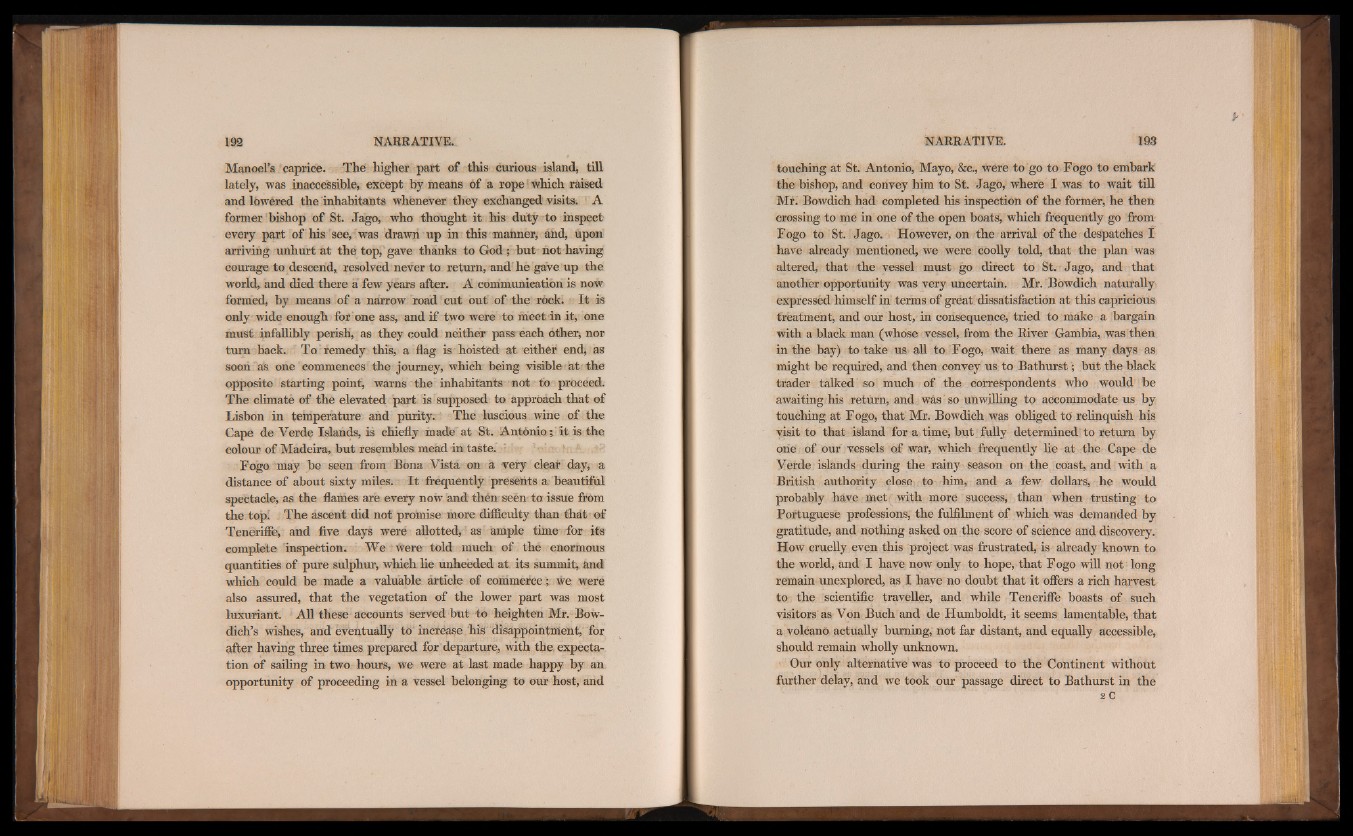
Manoel's caprice. The higher part of this curious island, till
lately, was inaccessible, except by means of a rope i which raised
and lowered the inhabitants whenever they exchanged'visits. A
former bishop of St. Jago, who thought it his duty to inspect
every part of his see, was drawn up in this manner, and, upon
arriving unhurt at the top, gave thanks to God; but not having
courage, to descend, resolved never to return, and* he gave up the
world, and died there a few years after. A communication is now
formed, by means of a narrow road cut out of "the rock. It is
only wide enough for one ass, and if two were to meet in it, one
must infallibly perish, as they could neither pass each other, nor
turn back. To remedy this, a flag is hoisted at. either end, as
soon as one commences the journey, which being visible-at the
opposite starting point, warns the inhabitants mat to proceed.
The climate of the elevated part is supposed: to approach that of
Lisbon in temperature and purity. The luscious wine of the
Cape de Verde Islands, is chiefly made at St. Antonio; it is the
eolour of Madeira, but resembles mead in taste. :
Fogo. may be seen from Bona Vista on a -very clear day, a
distance of about sixty miles. It frequently presents a-beautiful
spectacle, as the flames are every now and then seen- to issue from
the top; The ascent did not promise more difficulty than that of
Teneriffe, and five .days were allotted, as ample time -for its
complete inspection. We were told much of the enormous
quantities of pure sulphur, which lie unheeded at its summit, and
which could be made a valuable article of commerce ; we were
also assured, that the vegetation of the lower part was most
luxuriant. All these accounts served but to heighten Mr. Bow-
dich’s wishes, and eventually to increase his disappointment, for
after having three times prepared for departure, with the expectar
tion of sailing in two hours, we were at last made happy by an,
opportunity of proceeding in a vessel belonging to our host, and
touching at St. Antonio, Mayo, &c., were to go to Fogo to embark
the bishop, and convey him to St. Jago, where I was to wait till
Mf. Bowdich had completed his inspection of the former, he then
crossing to me in one of the open boats, which frequently go from
Fogo to St. Jago. However, on the arrival of the despatches I
have already mentioned, we were coolly told, that the plan was
altered; that the vessel must go direct to St. Jago, and that
another opportunity was very uncertain. Mr. Bowdich naturally
expressed himself in' terms of great dissatisfaction at this capricious
treatment, and our host, in consequence, tried to make a bargain
with a black man (whose vessel, from the River Gambia, was then
in the bay) to take us all to: Fogo, wait there as many days as
might be required, and then convey us to Bathurst; but the black
trader talked so much of the correspondents who would be
awaiting his return, and. was so unwilling to accommodate us by
touching at Fogo, that Mr. Bowdich was obliged to relinquish his
visit to that island for a time, but fully determined to return by
one of our vessels of war, which frequently lie at the Cape de
Verde islands: during the rainy season on the coast, and with a
British authority close; to him, and a few dollars, he would
probably have m et'w ith more success, than when trusting to
Portuguese professions, the fulfilment of which was demanded by
gratitude, and nothing asked on the score of science and discovery.
How cruelly even this project was frustrated, is already known to
the world, and I have now only to hope, that Fogo will not' long
remain unexplored, as I have no doubt that it offers a rich harvest
to the scientific traveller, and while Teneriffe boasts of such
visitors as Von Buch and de Humboldt, it seems lamentable, that
a volcano actually burning, not far distant, and equally accessible,
should remain wholly unknown.
Our only alternative was to proceed to the Continent without
further delay, and we took our passage direct to Bathurst in the
2C